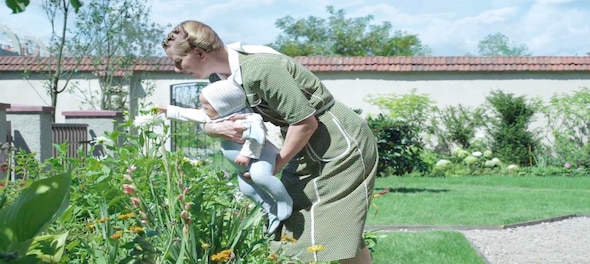
The Holocaust’s ghastly horrors are anything but behind us. It’s been 80 years and yet you can hear the screams, the agony, the rotting bodies. All you need to do is go on social media or switch on television. If it was Auschwitz and the other concentration camps then, it’s Ukraine and Gaza now. In all this time, much has changed but not man’s hunger to kill.
In the current cine-scape deluged with graphic, elaborate depictions of violence and mayhem, Jonathan Glazer’s directorial sticks out as an anomaly. For a Holocaust film that follows a family living right next to the Auschwitz camp, it doesn’t spend a moment on the other side of the wall. Instead, its entire focus is on the Höss ménage as they go about frolicking in their idyll, fussing over minuscule trivialities that constitute their paradisiacal domestic existence.
Rudolf Höss (Christian Friedel), the man of the house, is a commandant at the adjacent Auschwitz concentration camp. A staunch Nazi and S.S. member, he’s tasked with ensuring the smooth execution of the Fuhrer’s orders. Along with him in the appointed sprawling property live his wife Hedwig (a chilling Sandra Hüller), and their five children of varying ages ranging from prepubescent to infant. They have a pool in the backyard, a honey farm, and an enviable kitchen-and-flower garden that Hedwig obsesses over, their birthday celebrations are blessed with abundance and picnics with country delight.
This is a family trying hard to sustain an iridescent bubble next to the site of one of the most gruesome mass murders in human history. They go about it with such single-minded nonchalance, that it will unsettle you to the bones. Nothing bothers them. Not the constant sounds of gunshots, yelled orders, and anguished cries from beyond the wall. Not hoarding expensive items once owned by Jews. Not the sky turning an apocalyptic red every few hours as gigantic chimneys bellow smoke that reeks of burnt human flesh.
Glazer uses Martin Amis’s 2014 novel of the same name as source material. Rudolf Höss was Auschwitz’s longest-serving commandant, hanged to death for his unspeakable crimes against humanity after Germany lost WWII. But the film doesn’t tell you that. Instead, it shows you the Höss family living their dream life, the sweet fruit of Fuhrer’s promise in return for all their toil.
Glazer gives The Zone of Interest—which refers to the area around a concentration camp—a rich literary quality. All the action, and the important developments happen out of the frame. You either hear about it or are made privy to the before and the after of it. Glazer never lets you see any of it, forcing you to imagine what could have been.
There is not one shot of a dead body or any atrocity. However, each scene is laden with subtext. In one, an emaciated uniformed worker with a shaved head puts ashes in the mud to grow flowers that Hedwig gushes over, urging her infant daughter to take in their lovely fragrance. In another, we see a Jewish sexual slave enter the room while Rudolf is on a work call. She removes her shoes, rearranges her hair. In the next scene, we see him cleaning his privates as if they’d come in contact with something abhorrent.
Then there’s another in which he tells Hedwig on call how he couldn’t pay attention to anything at an opulent soiree meant for top Nazi administrators and officers because he was thinking about how he’d gas so many Jews all at once in such high-ceilinged chambers. Or the last scene that shows him spiral down the stairs into cruel, inhuman darkness.
Winner of the Grand Prix at the 76th Cannes Film Festival and three BAFTAs (including film not in the English language), The Zone of Interest has been nominated for five Academy Awards including Best Picture and Best Director. It deserves all the attention for it reimagines a genre so deeply seared in the public consciousness. There are several poignant Holocaust films that display a myriad of perspectives, telling stories of terror and hope, greed and power. And yet, The Zone of Interest stands out.
In excavating the past, it holds a mirror to the present. Mica Levi’s music and Johnnie Burn’s sound design are extraordinary—dirge-like, hypnotic, haunting. So is Glazer’s use of blank screens for extended periods. In the opening, he colors it black, and later in the film, red. In an age of diminishing attention spans, it makes you jittery, uncomfortable, as if walls were closing in from all sides.
I also like how the recurring fever dream of a girl hiding fruits for the Jewish inmates intercuts the coldness of the Hoss household. Or how whatever little semblance of sympathy there is—a daughter playing on piano a poem by a Jew poet or Hedwig’s mother fleeing without explanation—is pushed to the margins.
It’s been 80 years since the time The Zone of Interest is set in. It shouldn’t have hit as hard. But there is no underscoring the banality of evil and the gnawing reality that the past is never truly past us.
(Edited by : Ajay Vaishnav)
Check out our in-depth Market Coverage, Business News & get real-time Stock Market Updates on CNBC-TV18. Also, Watch our channels CNBC-TV18, CNBC Awaaz and CNBC Bajar Live on-the-go!


10% discount on fare on Mumbai Metro lines 2 and 7A on May 20
May 3, 2024 2:40 PM
'Rahul Gandhi deserted Amethi due to fear of Smriti Irani': How BJP plans to puncture Congress' UP plan
May 3, 2024 1:12 PM

